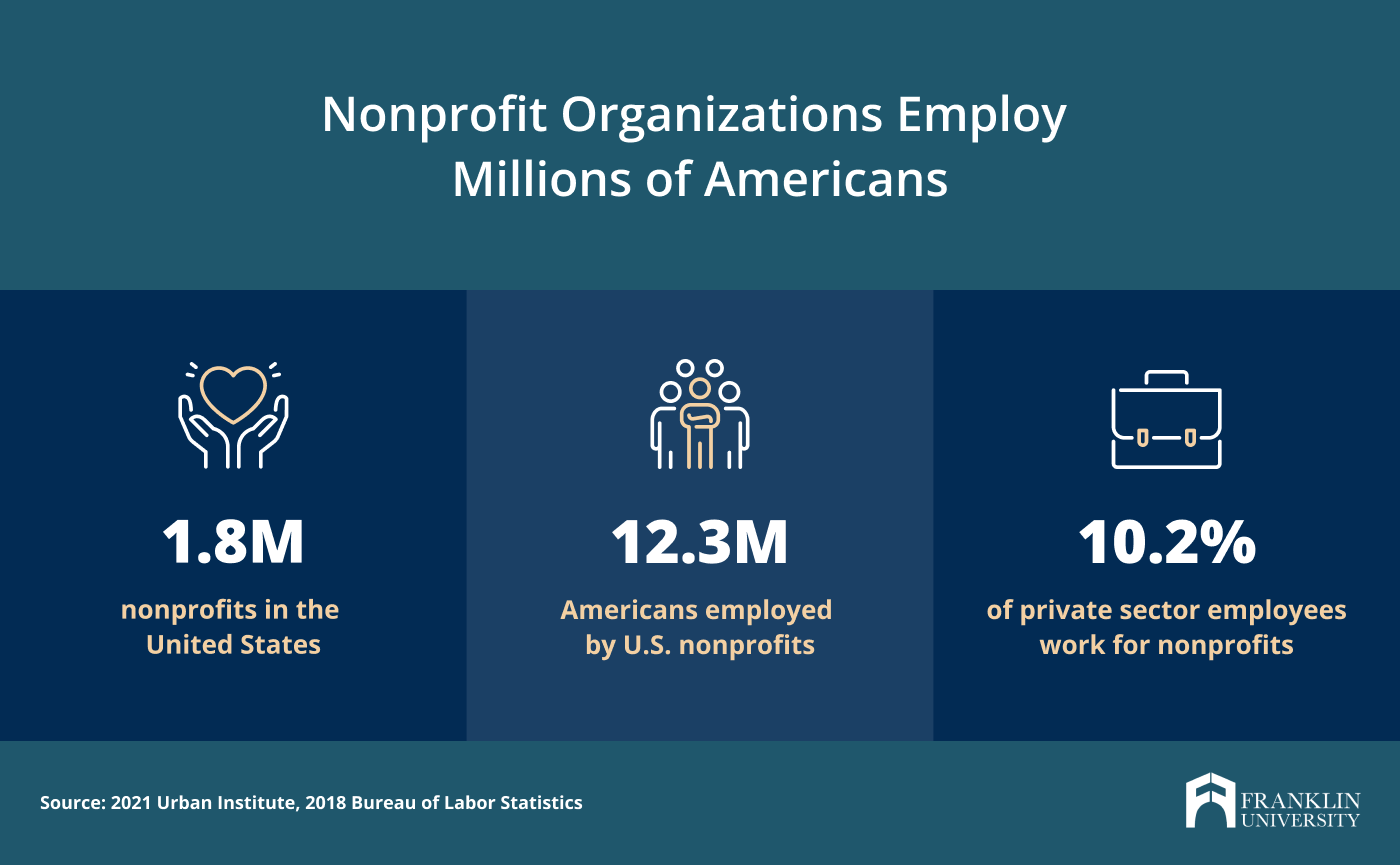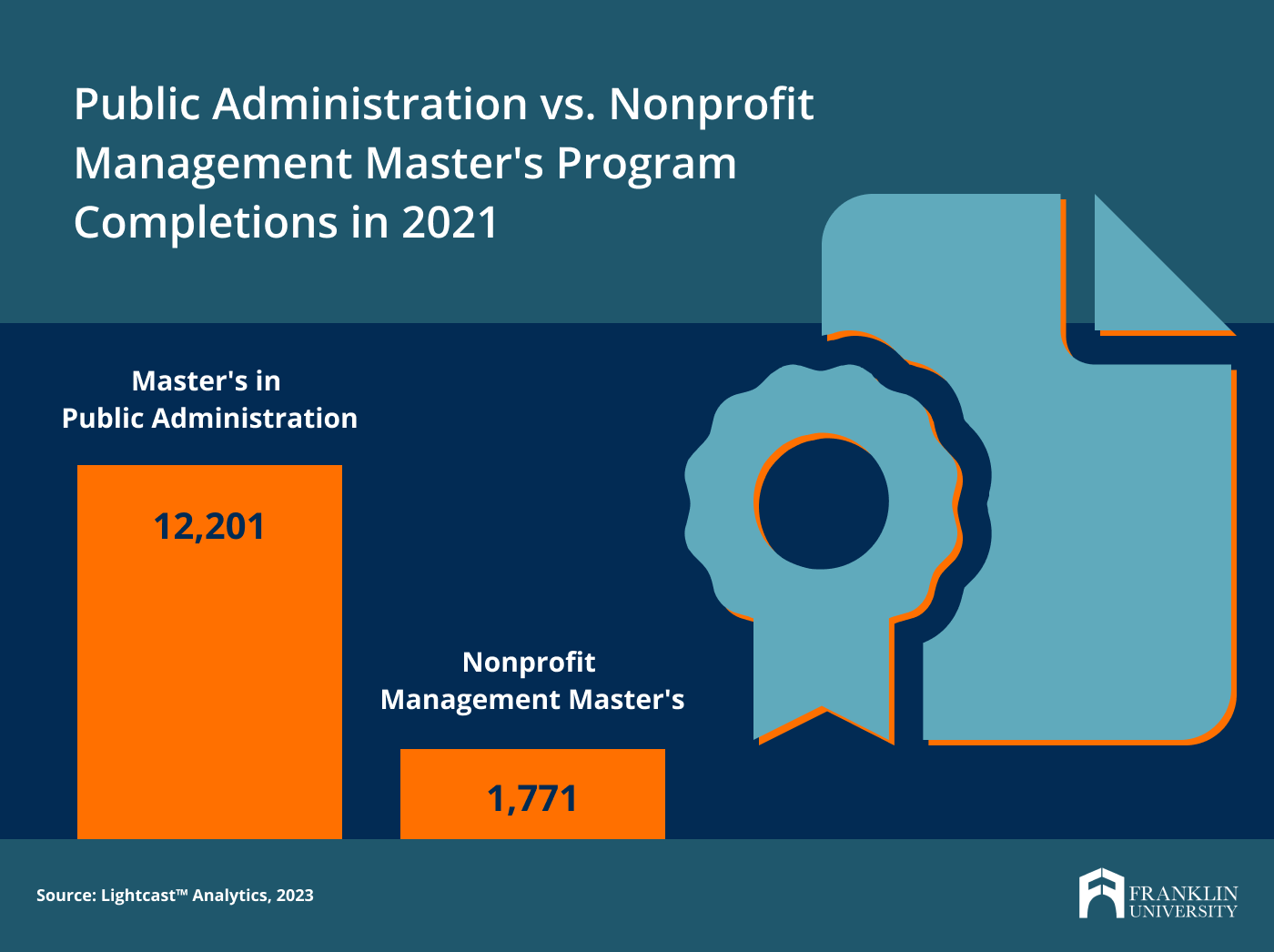Request Information
We're Sorry
There was an unexpected error with the form (your web browser was unable to retrieve some required data from our servers). This kind of error may occur if you have temporarily lost your internet connection. If you're able to verify that your internet connection is stable and the error persists, the Franklin University Help Desk is available to assist you at helpdesk@franklin.edu, 614.947.6682 (local), or 1.866.435.7006 (toll free).
Just a moment while we process your submission.

Nonprofit Management Degrees: What You Need to Know
Did you know that approximately 10% of private sector employees work for nonprofits, according to the Bureau of Labor Statistics?
With over 1.8 million registered 501(c)(3) charitable organizations in the United States, the sector offers impactful, meaningful work in a wide array of roles. Leadership positions in nonprofits offer an especially rewarding opportunity for mission-driven professionals to make a difference in their communities.
Many professionals working for nonprofits choose to pursue advanced education to prepare them for these high-level roles, but choosing a program can be challenging. To help you find your path forward, we’ve outlined degree options for professionals working in nonprofits as well as their pros and cons.

What Degree Do You Need to Work in Nonprofit Management?
Generally speaking, careers in nonprofit management don’t require one specific educational background or degree. Some organizations, such as those that work on healthcare or legal issues, may prefer to hire leaders with a professional or educational background in that area.
For most nonprofit management positions, however, a degree that covers managerial topics such as budgets and personnel management in addition to public sector and nonprofit-related issues will offer excellent preparation.
What matters most when choosing a master’s program? Compare features, benefits and cost to find the right school for you.
What Undergraduate Degrees Can You Earn for Nonprofit Management?
Most students will be well-served by undergraduate programs that teach foundational management, financial and communications skills, which may or may not focus specifically on nonprofits. Relevant degrees for future nonprofit leaders include:
- Nonprofit management
- Business administration
- Applied management
- Financial management
- Communications
- Economics
If you wish to work in a nonprofit with a mission related to a specific field, such as criminal justice, global health or public safety, pursuing a degree in that area may also be a good choice.
If you’ve already earned an undergraduate degree in a different field, don’t worry. It’s possible to enter the sector with a variety of backgrounds. Plus, graduate study is always an option if you wish to build out your credentials or develop your skills further.
What Graduate Degrees Can You Earn for Nonprofit Management?
A number of graduate degrees offer excellent preparation for nonprofit management positions. Options include:
Master’s in Nonprofit Management
Specialized nonprofit master’s programs often have coursework related to grant writing, fundraising and resource development, in addition to organizational leadership, financial management and personnel management. While this degree can be a great choice if you know you want to spend your career in nonprofits, it may not be as flexible as other choices if your goals change.
Master of Public Administration (MPA)
A Master of Public Administration is a graduate degree geared toward current and aspiring public sector and nonprofit leaders. Essentially, an MPA is the public sector equivalent of an MBA program. MPA programs approach organizational leadership topics like financial management and personnel management with public sector considerations top-of-mind. They also cover topics like public policy, communication and working within political systems.
“Nonprofit professionals choose to pursue an MPA for a variety of reasons,” explains Dr. Wendy Eaton, chair of Franklin University’s Master of Public Administration program. “An MPA degree is a more comprehensive degree, so it opens the door to a wider range of career opportunities than a nonprofit management degree. The curriculum is focused on public service and how to achieve social impact – not just management techniques. Since many nonprofits work closely with public sector organizations, the knowledge and skills that are part of the MPA degree prepare graduates to work with governmental organizations more effectively.”
Master of Business Administration (MBA)
While MBAs are typically geared toward private-sector employment, they can prepare students for leadership roles in all kinds of organizations. Some schools offer MBA programs with nonprofit or public sector-related courses. However, while topics such as management and marketing are relevant to nonprofits, they are typically approached differently in the nonprofit world than in the private sector. This degree may be a good fit for professionals who wish to help businesses work toward their social and environmental goals, or who are unsure whether they want to work in nonprofits or the private sector long-term.

What Can You Earn in Nonprofit Management?
Nonprofit salaries range widely based on the size and funding of the organization. A few potential roles include:
Budget analyst
Budget analysts in nonprofits and private companies plan finances, monitor budgets and track spending.
- Median advertised salary: $65,200
Social services manager
Social services managers direct and oversee a nonprofit’s services and offerings and may also coordinate with government agencies, often in areas related to health and welfare.
- Median advertised salary: $66,300
Nonprofit director
A nonprofit director heads a nonprofit organization or department. This role can vary significantly in scope and salary based on the size of the organization, but generally includes setting and implementing organizational or departmental goals, overseeing programs and staffing, setting budgets and working with outside partners.
- Median advertised salary: $88,800
Director of development
Development directors manage and oversee an organization’s fundraising operations. Depending on the nonprofit, this can include everything from grant writing to working with high-level donors.
- Median advertised salary: $94,600
Policy director
Nonprofit policy directors manage an organization’s relationships with local, state and federal officials. This can include analyzing new and existing legislation and planning the organization’s response if the legislation is relevant to its work.
- Median advertised salary: $100,100
Is a Nonprofit Management Degree Right for You?
While nonprofit-specific master’s degrees can offer excellent preparation for jobs in this field, they are not the only option. In fact, nonprofit management degrees are less common and less widely recognized than MPA and MBA degrees. That’s why it’s important to think broadly about your long-term goals and explore how each type of degree can help you move forward.
As you decide which programs to apply to, consider the specific curricula of each program that interests you, as well as factors like price and timeline. If possible, reach out to other nonprofit leaders to learn more about how their education has shaped their careers. It’s also worth comparing each school’s internship opportunities, alumni network and career support.
Start Your Journey to Nonprofit Management
If you’re looking for a graduate degree to help you build the real-world skills you need to lead in the nonprofit sector, Franklin’s Master of Public Administration program may be right for you.
You’ll learn from faculty with deep experience in the nonprofit and government sectors and get hands-on support to customize your degree around your interests and aspirations. Through real-world scenario-based assignments and engaging discussions, you’ll build the capabilities to take on the current and emerging challenges that nonprofits face.
Franklin’s MPA program is delivered 100% online, with a flexible format that allows you to balance your studies with your career. You can earn your degree in as few as 17 months, allowing you to take your next step sooner.
Learn more about how a master of public administration at Franklin can help you build your nonprofit career.





